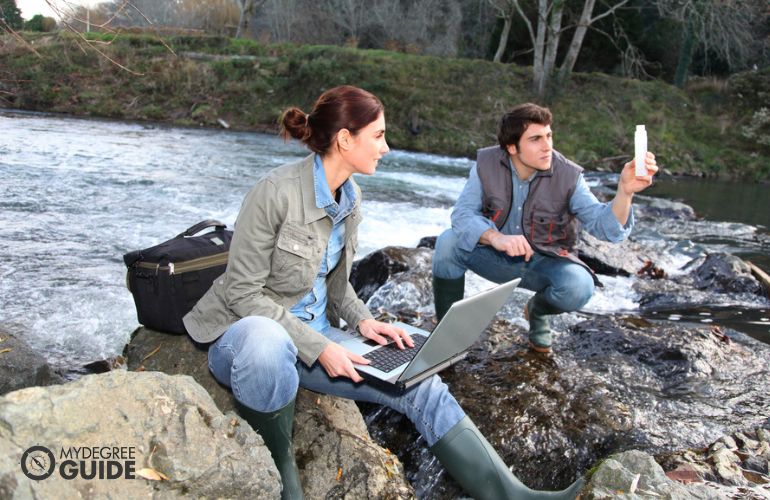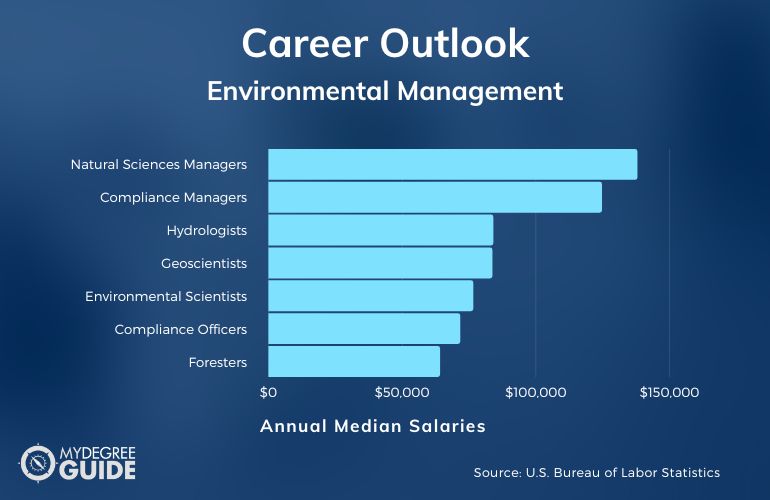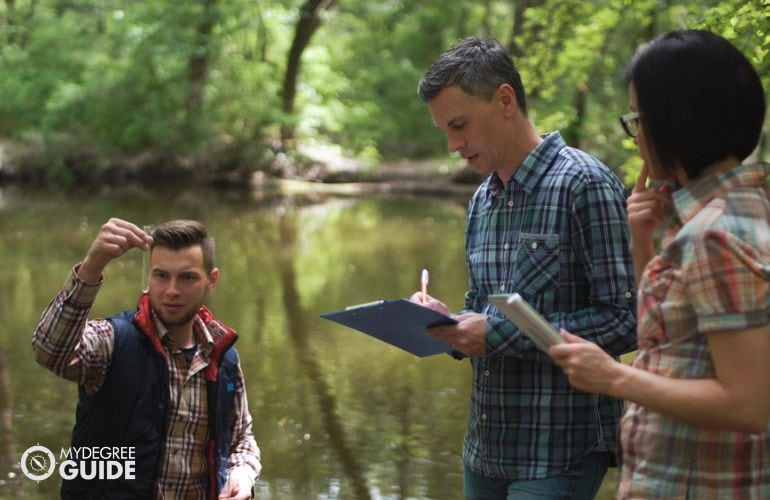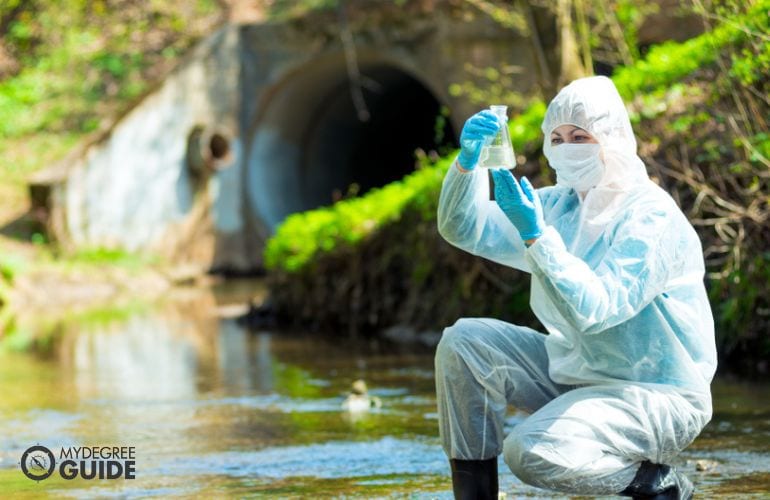If you’re passionate about helping preserve the environment and develop sustainability solutions, then you might consider looking into environmental management degrees.

An environmental management major is designed to help prepare you to tackle today’s environmental challenges as well as equip you with both scientific and management skills.
Editorial Listing ShortCode:
From analyzing the effect of the environment on health to developing sustainability solutions for the industrial sector and managing pollution, this field can be a rewarding area of study.
Universities Offering Online Bachelors in Environmental Management Degree Programs
Methodology: The following school list is in alphabetical order. To be included, a college or university must be regionally accredited and offer degree programs online or in a hybrid format.
Arizona State University
Arizona State University offers an online Bachelor of Science in Sustainability program online. Areas of emphasis include Economics of Sustainability, Sustainable Ecosystems, and Sustainable Energy, Materials, and Technology.
The program requires the completion of 40 courses that are typically 7.5 weeks long each. Community engagement and experiential learning are commonly emphasized as a learning goal of the program.
ASU is accredited by the Higher Learning Commission.
Bellevue University
Bellevue University offers a program for a Bachelor of Science in Sustainability Management. Potential courses include Current Trends in Energy Technology, Green Technologies and Natural Resource Conservation, and International Development and Sustainability. A cohort system is typically used and usually 1 course is taken at a time.
Bellevue University is accredited by the Higher Learning Commission.
Colorado State University
Colorado State University offers a BS in Environmental and Natural Resource Economics program online. The program commonly provides opportunities to interact with instructors and classmates.
Potential courses include Agricultural and Resource Enterprise Analysis, Economics of Outdoor Recreation, and Agricultural Policy. A common focus of the program is on evaluating the past, current, and future economic impacts of various policies at a local, regional, and global scale.
Colorado State University is accredited by the Higher Learning Commission.
Columbia Southern University
Columbia Southern University offers an online program for a BS in Environmental Management. Potential courses include Assessing Environmental Science, Environmental Law, Waste Management, Fundamentals of Occupational Safety and Health, and Air Quality. The program aims to teach the theory, technology, and collaborative practices commonly used in environmental management.
Columbia Southern University is accredited by the Southern Association of Colleges and Schools Commission on Colleges.
Florida International University
Florida International University offers a program for an online Bachelor of Arts in Sustainability and the Environment. The program aims to facilitate collaboration with classmates. An introductory course in statistics and in microeconomics is highly recommended before entering the program. New terms typically begin in the fall, spring, and summer.
Florida International University is accredited by the Southern Association of Colleges and Schools Commission on Colleges.
Indiana University
Indiana University offers a BA in Sustainability Studies program online. Potential coursework includes Social and Behavioral Foundations of Sustainability, Methods and Techniques for Sustainability, and Business and Economics of Sustainability. Access to resources such as tutoring, career services, and success coaching is commonly provided, and internship opportunities are typically available.
Indiana University is accredited by the Higher Learning Commission.
Liberty University
Liberty University offers an online program for a BS in Business Administration with a concentration in Green and Sustainable Management. Courses are typically 8 weeks long, and the program takes an average of 3.5 years to complete. Up to 75 percent of required credits may be transferred in from another university or college.
Liberty University is accredited by the Southern Association of Colleges and Schools Commission on Colleges.
Lynn University
Lynn University offers a bachelor’s degree in environmental policy and management program online. Potential courses include Global Management, Environmental Risk and Public Health, and Human Environment Interactions. A 1 on 1 mentoring and support program from experienced faculty and academic advisers is offered. Lynn was listed among the best online bachelor’s programs by U.S. News & World Report.
Lynn University is accredited by the Southern Association of Colleges and Schools Commission on Colleges.
Maryville University
Maryville University offers an online program for a BS in Sustainability. Concentrations include Environmental Science, Business, and Policy. Potential courses include Environmental Science and Health, Nature and Humanity, and Business Statistics. Either an internship or a capstone project must be completed.
The program aims to teach skills in providing opportunities to improve processes, increase revenue, and create healthier communities.
Maryville University is accredited by the Higher Learning Commission.
Oregon State University
Oregon State University offers a BS in Sustainability program online. The program commonly offers success coaching, library services, free online tutoring, and career guidance. The program uses a quarterly academic calendar, and classes are typically 11 weeks long. There are often 4 start dates each year. The program may be completed as a dual degree paired with any other major.
Oregon State University is accredited by the Northwest Commission on Colleges and Universities.
Purdue University
Purdue University offers an online program for a Bachelor of Science in Environmental Policy and Management. Courses are typically 10 weeks long, and usually require a time commitment of 15 to 18 hours per week. An internship is offered to gain hands-on experience, and credit for life and professional career experiences may be awarded.
Purdue University is accredited by the Higher Learning Commission.
St. Petersburg College
St. Petersburg College offers a BAS in Sustainability Management program online. Course options include Introduction to Environmental Science, Materials and Methods of Construction, Natural Resources Conservation and Management, and Grant Administration.
Courses are typically 8 weeks long. The program commonly offers advisory committee members who seek to ensure skills taught in the courses match industry needs and trends.
St. Petersburg College is accredited by the Southern Association of Colleges and Schools Commission on Colleges.
State University of New York College of Environmental Science and Forestry
The State University of New York College of Environmental Science and Forestry offers an online program for a Bachelor of Science in Environmental Science and Forestry. The opportunity to participate in field experiences such as internships and service learning is commonly offered. The program commonly offers a “personal concierge,” 1 advisor who acts as a single point of contact to answer any questions.
SUNY College of Environmental Science and Forestry is accredited by the Middle States Commission on Higher Education.
Unity College
Unity College offers a BS in Environmental Studies program online but with some fieldwork assignments. Concentrations include Renewable Energy, Environmental GIS, Sustainable Business, Emergency Disaster Management, and Wildlife Ecology. Up to 90 credits from outside accredited institutions may be transferred in. A 1 on 1 academic advising model and job placement assistance are commonly offered.
Unity College is accredited by the New England Commission of Higher Education.
University of Arizona
The University of Arizona offers a Bachelor of Science in Sustainable Built Environments program online. Areas of emphasis include Sustainable Buildings and Sustainable Real Estate Development. Classes typically include group discussions and collaborative learning projects. The University of Arizona was ranked the number 10 Best Online Bachelor’s Program in the Nation by US News & World Report.
The University of Arizona is accredited by the Higher Learning Commission.
University of Central Missouri
The University of Central Missouri offers a Bachelor of Science in Occupational Safety program with an emphasis in Environmental Management. Summer courses are commonly offered entirely online, but some fall and spring semester courses may require on-campus work. Potential courses include Exploring the Safety Sciences, Industrial Hygiene, and Environmental Compliance.
The University of Central Missouri is accredited by the Higher Learning Commission.
University of Florida
The University of Florida offers an online program for a BS in Environmental Management. The program usually includes some on-campus labs, but these may be completed at a nearby community college rather than in Gainesville. Potential coursework includes Environmental Biochemistry, Environmental Nutrient Management, and Natural Resource Policy and Economics.
The University of Florida is accredited by the Southern Association of Colleges and Schools Commission on Colleges.
University of Illinois – Urbana Champaign
The University of Illinois–Urbana-Champaign offers an online program for a Bachelor of Science in Earth, Society, and Environmental Sustainability. Concentrations include Science in the Earth System and Society and Environment. The program is designed for degree completion, and at least 30 credit hours should have been completed before admission. Most classes are 8 weeks long.
The University of Illinois – Urbana Champaign is accredited by the Higher Learning Commission.
University of Maryland Global Campus
The University of Maryland Global Campus offers a BS in Environmental Management program online or in a hybrid format. Potential courses include Environment and Ecosystems Principles, Introduction to Geographic Information Systems, and Human Health and Disease. The program is designed to provide hands-on experience in identifying and evaluating air, water, land, and energy resource needs.
The University of Maryland Global Campus is accredited by the Middle States Commission on Higher Education.
University of Massachusetts – Amherst
The University of Massachusetts–Amherst offers a Bachelor of Arts in Interdisciplinary Studies with a concentration in Sustainability Studies program online. Courses typically begin in the fall, spring, and summer.
The program is designed for degree completion, and at least 12 college credits should have been earned before admission.
The University of Massachusetts Amherst is accredited by the New England Commission of Higher Education.
University of North Alabama
The University of North Alabama offers an online program for a Bachelor of Science in Sustainability. Potential courses include Sustainable Earth, Climate Change, Environmental Systems, Sustainable Ecosystems, and Water Resources. The program is designed to prepare to work in primary sectors in sustainability, including food and agriculture, energy resources, water resources, and waste.
The University of North Alabama is accredited by the Southern Association of Colleges and Schools Commission on Colleges.
University of Phoenix
The University of Phoenix offers a Bachelor of Science in Environmental Science program online. Potential courses include Principles of Environmental Science, Conservation Biology, and Ecology and Evaluation.
The program focuses on teaching environmental issues and renewable resources, scientific reasoning, communication, and foundational research methods. Courses are typically 5 to 7 weeks long and are usually taken 1 at a time.
The University of Phoenix is accredited by the Higher Learning Commission.
University of Wisconsin
The University of Wisconsin offers a Bachelor of Science in Sustainable Management program online through its Extended Campus. Online forums and virtual networking events are typically a primary part of the program. The program is designed to be for bachelor’s degree completion, and it usually takes 2 years to complete.
The University of Wisconsin is accredited by the Higher Learning Commission.
Virginia Wesleyan University
Virginia Wesleyan University offers a BA in Sustainability Management online program. Potential courses include Economics and the Environment, Environmental Geology, Sustainability Accounting, and Supply Chain Management and Logistics. The program offers an emphasis on real-world problem solving and aims to teach skills and knowledge in corporate sustainability, environmental consulting, and environmental law.
Virginia Wesleyan University is accredited by the Southern Association of Colleges and Schools Commission on Colleges.
Online Bachelors in Environmental Management Degrees

A bachelors in environmental management degree is designed to provide students with the knowledge needed to manage natural resources and protect the environment.
This program aims to help students tackle environmental issues present in the world today, such as water resources, air pollution, climate change, and more. This degree features a solid foundation in topics ranging from data assessment and research methods to environmental chemistry and ecosystem principles.
On this degree path, you can also expect to learn:
- Data analysis to determine potential adverse effects of biological and chemical agents
- Identification and evaluation of water, air, land, and energy resource needs
- Soil science
- Hydrology
- Pest management
- Agricultural ecology
- Leadership skills to effectively communicate on environmental issues
You may have the option of concentrating in areas like hazard or pollution management. Graduates may also explore paths to sustainability in various sectors, including commerce.
Other areas in which graduates may find careers include sustainable food and fiber production, environmental policy and analysis, water or energy resources, pollution management, and soil conservation. They may also work as environmental consultants for various agencies and companies to combat air pollution and ensure that an organization is complying with environmental regulations.
Some environmental management professionals become sustainability consultants or environmental consultants to government agencies. This type of role could enable them to potentially affect environmental policy decisions.
Environmental Management Careers & Salaries

Due to the solid foundation of environmental knowledge this degree provides, graduates may find positions in a wide variety of sectors. This includes consulting companies, government agencies, and even agricultural companies, where maintaining a sustainable environment is key.
According to the Bureau of Labor Statistics, here are the median annual wages for a number of careers associated with environmental management.
| Careers | Annual Median Salaries |
| Natural Sciences Managers | $137,900 |
| Compliance Managers (Included in Managers, All Other) | $124,650 |
| Hydrologists | $84,030 |
| Geoscientists | $83,680 |
| Environmental Scientists and Specialists | $76,530 |
| Compliance Officers | $71,650 |
| Foresters | $64,110 |
| Conservation Scientists | $63,750 |
| Fish and Game Wardens | $60,730 |
| Environmental Science and Protection Technicians | $47,370 |
Graduates may also find careers in environmental policy development, soil or water conservation efforts, pollution management, and global stewardship of natural resources.
Common career titles include environmental consultant, conservation officer, natural resource manager, hydrologist, conservation officer, and restoration ecologist. Environmental management majors may have the option to choose a concentration, such as hazard control, which can influence career outcomes.
BS in Environmental Management Curriculum & Courses

Specific courses in an environmental management major can differ between schools, but many are similar in the standard curriculum. Courses may include:
- Environment and Ecosystems Principles: This course provides an overview of the principles that govern ecosystems as well as how resource development and industrial processes affect these environments.
- Environmental Regulations and Policy: This course analyzes the principles of administrative and constitutional law that apply to environmental management as well as health and safety management.
- Human Health and Disease: This course overviews the major components of the human body and factors that affect health, such as poisoning by environmental toxins and malnutrition.
- Geographic Information Systems (GIS): This course provides an introduction to GIS software and includes analyzing data, building databases, considering spatial context, and interpreting results.
- Environmental Health: This course studies the effects of environmental hazards, such as biological, chemical, or physical hazards on human health, and it includes the study of air, water, and soil pollution.
- Occupational Health and Safety: This course overviews the principles of health and safety in the workplace, and it includes topics related to the control of workplace hazards.
- Environmental Technology: This course provides an introduction to the use of technology in environmental management, including the use of technologies to mediate air, water, and land pollution.
- Global Environmental Management Issues: The goal of this course is to learn how to develop and evaluate environmental management projects, and it is global in scale.
- Air Quality Management: This course overviews air quality management strategies and includes strategies to identify the source of and mitigate air pollution.
- Pollution Prevention Strategies: This course covers systems and strategies that help prevent and minimize pollution, including recycling, material substitution, process modifications, quality assurance, and zero discharge.
You may also have the opportunity to choose a concentration within environmental management, such as toxicology and hazard control or sustainability.
Admissions Requirements

While admissions requirements can vary depending on your school, there are many similarities in what you’re be required to submit when applying for bachelor programs. Some of the most common requirements are:
- Official high school transcripts
- Minimum high school GPA (varies by school)
- Completed online application
- SAT or ACT scores (if required)
A growing number of schools no longer require SAT or ACT scores for undergraduate admissions. It’s helpful to talk to an admissions officer to determine whether you need them.
Environmental Management Degrees Accreditation

Before pursuing an online environmental management degree, it’s strategic to make sure your institution is accredited.
Accreditation is the quality assurance that your chosen college or university meets predefined standards of quality. Whether a school is accredited can affect your future employment opportunities, as some employers only recognize degrees from accredited institutions. In addition, attending an accredited school is also an eligibility requirement for various forms of financial aid.
There are only a handful of regional accrediting organizations, and they’re listed on the Council for Higher Education Accreditation (CHEA) website, along with a database of accredited schools.
Financial Aid and Scholarships

Many students pursuing a bachelors in environmental management online degree seek financial assistance to complete their program. Luckily, there are many aid opportunities for qualifying students.
Federal aid can exist in the form of student loans or even grants. Loans and grants can also apply at your state level, depending on where you live and where your university is located. You may also be eligible for private grants and scholarships from institutions. Opportunities for funding exist for a range of circumstances, so it might be helpful to thoroughly explore grant opportunities.
If you’re currently employed, your employer may also be able to help. Many companies offer programs that allocate a portion of funds to employee education. You can talk to your HR department to discover more.
What Is an Environmental Management Degree?

An environmental management degree is designed to help prepare students to identify and evaluate current and future air, water, and energy resource needs.
It will likely cover all aspects of environmental management strategies, including risk assessment, pollution remediation, hazard control, public safety, and risk management. Coursework may also center on sustainability practices and solutions and involve a fair amount of data assessment, statistics, biology, and chemistry.
Topics could also cover emerging environmental improvement technologies as well as wildlife management and industrial ecology.
Is Environmental Management a Good Degree?

Yes, environmental management is a good degree for many undergraduate students. Aside from being a current global concern—which could result in higher demand and more career opportunities—environmental management can also be a rewarding field of study.
Many environmental management professionals work toward mitigating environmental damage and protecting natural resources. A degree in this field could help you qualify for a range of career paths, depending on your interests and degree concentration.
Graduates may choose to become environmental consultants or environmental policymakers at the government level, become conservation officers, or even work in global pollution management.
What Can You Do with a Bachelor of Environmental Management?

Due to the growing number of environmental concerns in our modern era, experts in environmental management are in demand.
Due to the diverse amount of environmental knowledge provided in this degree path, such as sustainability models and hazard control, students may be primed for a range of careers. A degree concentration may impact your qualifications as well.
Potential career paths in this field include environmental consultant or analyst, compliance and quality control manager, natural resource scientist, environmental protection specialist, and more. Some professionals go on to become restoration ecologists, hydrologists, and conservation officers.
What Degree Do You Need to Be an Environmental Manager?

Typically, a bachelors degree in environmental management is sufficient to enter the field. In this degree path, students are introduced to the major principles of environmental management and sustainability, which can help prepare them for career entry.
Bachelor-degree holders may also qualify for senior or management positions once they’ve gained experience in the field. Continuing on to earn an on-campus oronline masters environmental management may provide a competitive edge to your resume but generally isn’t required to enter the field.
Some employers may prefer a masters-level education, though, for leadership positions. If you would like to enter a research position, a masters degree may be useful.
How Long Does It Take to Get an Environmental Management Degree Online?

Generally, it takes 4 years to complete an environmental management bachelors degree online if you follow a traditional, 16-week semester and attend full-time.
If you instead follow an 8-week semester and stay continuously enrolled year-round—which includes summer enrollment—you may be able to finish in less time. If at any point you choose to enroll part-time, this may extend the amount of time it takes you to complete your degree.
What’s the Difference Between an Environmental Science vs. Environmental Management Bachelor’s Degree?
While both of these degrees deal with the environment and have many overlaps, their core focuses are different.
- Bachelor’s in Environmental Management: Environmental management is focused on the preservation and maintenance of environmental resources, such as water.
- Bachelor’s in Environmental Science: Environmental science is focused on studying functions of the environment using chemistry, math, physics, and biology in order to see how the environment and other living things affect one another.
Environmental management focuses on managing the environment, while environmental scientists may conduct more field or laboratory studies to learn about environmental processes.
Is an Environmental Management Degree Worth It?

Yes, an environmental management degree is worth it for many students. Concerns regarding the environment continue to grow, making careers involving the environment in demand.
Career opportunities can also be diverse due to the variety of natural resources we consume and the varying types of pollutants that need to be managed. Responsibilities can range from consulting for businesses and government agencies to preserving different types of environments and resources.
According to the Bureau of Labor Statistics, environmental scientists and specialists are expected to see 5% job growth over the next ten years. This is in pace with the national average.
Getting Your Bachelor’s Degree in Environmental Management Online

Earning a degree in environmental management online is a convenient way to prepare to help create a cleaner, more sustainable Earth.
In this bachelors program, you may have the chance to be involved in resource management, pollution mitigation, hazard control, restoration and conservation of habitats, and more. Plus, environmental management professionals may be able to work closely with agriculture companies or even government agencies to determine the ideal management of crucial resources.
If you’re passionate about the environment and desire to make a positive impact on natural resource use, then an environmental management degree may be a good fit. Why not start exploring available programs from accredited schools today?
